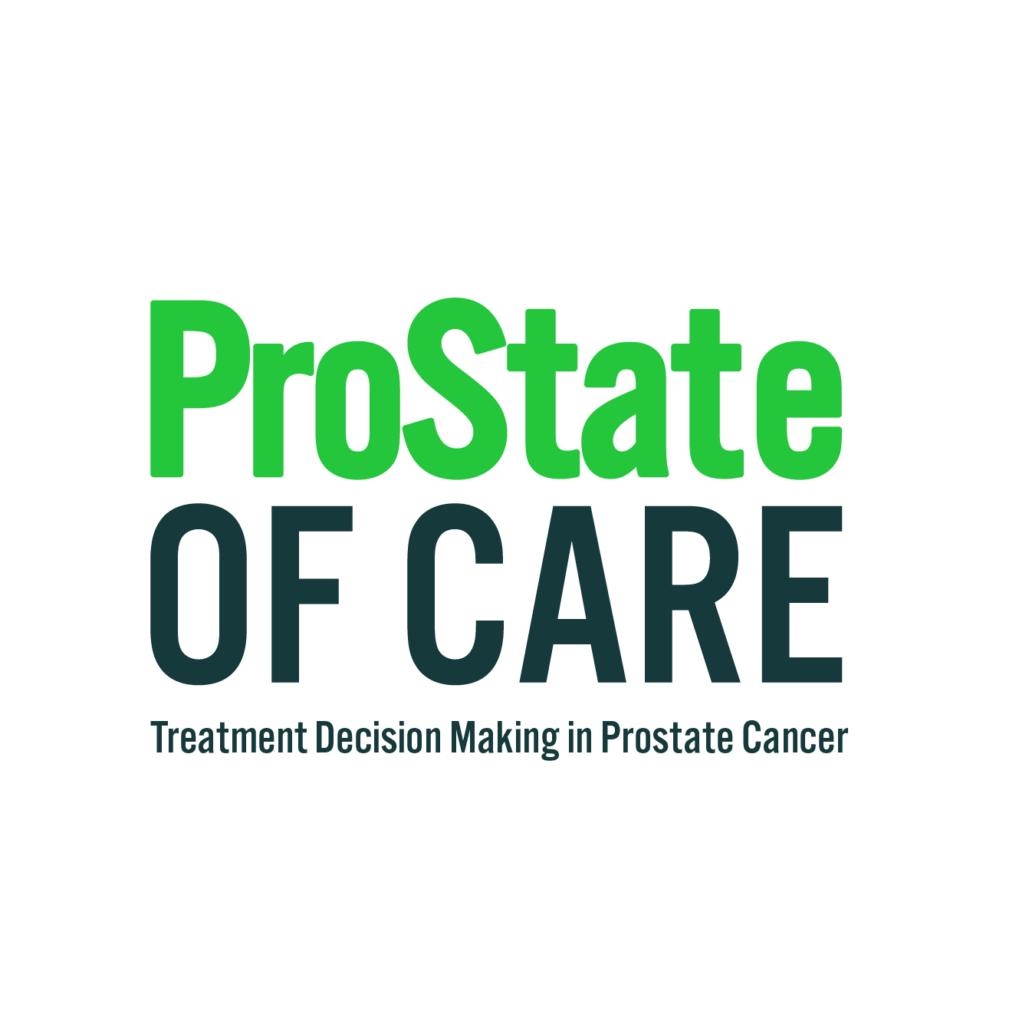
Survey of U.S. Physicians Treating Advanced Prostate Care Looked Into Clinical Guideline Adherence – Is There a Potential Disconnect Between Reported Reliance on Guidelines to Inform Disease Management and Actual Use in Decision-Making?
 To better understand the prescribing habits of clinicians treating advanced prostate cancer patients and potential barriers to following professional guideline recommendations, Astellas and Pfizer partnered with The Harris Poll to carry out the ProState of Care: Treatment Decision Making in Prostate Cancer survey of 300 U.S. physicians (n=150 oncologists, n=150 urologists) who are duly licensed and treat at least three Stage III or Stage IV advanced prostate cancer patients each month.[1]
To better understand the prescribing habits of clinicians treating advanced prostate cancer patients and potential barriers to following professional guideline recommendations, Astellas and Pfizer partnered with The Harris Poll to carry out the ProState of Care: Treatment Decision Making in Prostate Cancer survey of 300 U.S. physicians (n=150 oncologists, n=150 urologists) who are duly licensed and treat at least three Stage III or Stage IV advanced prostate cancer patients each month.[1]
Of the 150 U.S. oncologists and 150 U.S. urologists surveyed, the results revealed[1]:
- Most oncologists (71%) and urologists (73%) surveyed say that professional clinical practice guidelines are one of their top three sources of information when they have questions about how to determine which treatments to prescribe for their advanced prostate cancer patients.
- Most oncologists (86%) and urologists (96%) say they very/somewhat closely adhere to advanced prostate cancer treatment/management clinical guidelines. (very closely: 31% of oncologists, 41% of urologists; somewhat closely: 55% of oncologists, 55% of urologists)
- 71% of oncologists and 79% of urologists surveyed say they strongly/somewhat disagree with the statement “I don’t think that clinical guidelines are very important.” (strongly disagree: 43% of oncologists, 51% of urologists; somewhat disagree: 28% of oncologists, 28% of urologists)
- Over a quarter of surveyed oncologists (29%) and a fifth of surveyed urologists (21%) strongly/somewhat agree with the statement “I don’t think that clinical guidelines are very important.” (strongly agree: 8% of oncologists, 5% of urologists; somewhat agree: 21% of oncologists, 15% of urologists)
- More than half of surveyed oncologists and urologists (62% of oncologists, 54% of urologists) say they strongly/somewhat agree with the statement: “I tend to develop treatment plans based on experience, even if they are not within clinical guidelines.” (strongly agree: 13% of oncologists, 10% of urologists; somewhat agree: 49% of oncologists, 44% of urologists)
- Around half of oncologists and urologists surveyed (55% of oncologists, 46% of urologists) say they strongly/somewhat agree that they have too many competing priorities to be able to pay attention to clinical guidelines. (strongly agree: 8% of oncologists, 5% of urologists; somewhat agree: 47% of oncologists, 41% of urologists)
- 45% of oncologists and 54% of urologists surveyed say they strongly/somewhat disagree that they have too many competing priorities to pay attention to clinical guidelines. (strongly disagree: 15% of oncologists, 11% of urologists; somewhat disagree: 30% of oncologists, 43% of urologists).
- The survey asked physicians to rate the importance of the following priorities: clinical time spent with patients, staying up to date on new and emerging treatment options, staying up to date on clinical guidelines, open dialogue with patients and/or caregivers about their treatment plan, personalizing a treatment plan for patients, including caregivers (where applicable) in patient discussions and treatment decisions and staying up to date on academic research, with nearly half or more of each specialty saying that each of these is absolutely essential or extremely important in their practice.
- About a third of oncologists and urologists surveyed (34% of oncologists, 32% of urologists) say they strongly/somewhat agree with the statement: “I’ve given up trying to stay up to date on clinical guidelines.” (strongly agree: 16% of oncologists, 11% urologists; somewhat agree: 18% of oncologists, 21% of urologists)
- The survey found that increasing overall survival is the number one factor they consider (73% of oncologists and 60% of urologists) when it comes to treatment goals to prioritize, followed by slowing the spread of their patient’s cancer (17% of oncologists and 26% of urologists), and delaying time before the next therapy (5% of oncologists and 11% of urologists).
- Just under half of physicians (47% of oncologists and 46% of urologists) surveyed say they reserve novel hormone therapies (NHTs) for “only my high-risk metastatic castration-sensitive prostate cancer (mCSPC) patients” despite recommendations in the guidelines from organizations such as the American Society of Clinical Oncology (ASCO) and the American Urological Association (AUA), recommending that treatment intensification, including NHTs, be considered. (ASCO Guidelines: Recommendation 1.0 and strong recommendation; AUA Guidelines: Evidence Level Grade A)[2],[3]
- 11% of urologists surveyed say they do not prescribe NHTs for any of their mCSPC patients (compared to 3% of oncologists).
- 11% of oncologists and 22% of urologists surveyed say they: “want to save novel hormone therapies for if/when disease progresses to” metastatic castration-resistant prostate cancer (mCRPC).
- 56% of oncologists and 52% of urologists surveyed said that new (or new to them) study data showing the benefits of prescribing NHTs earlier in the treatment pathway (e.g., delayed disease progression, increase in overall survival, etc.) would cause them to prescribe NHTs earlier.
- On average, about one-third of oncologists’ patients (30%) and urologists’ patients (32%) are currently being treated with NHTs. Survey data showed oncologists’ and urologists’ patients are being treated most commonly with LHRH agonists (33% of oncologists’ and 51% of urologists’ patients on average), and fewer are being treated with treatments such as chemotherapy (19% of oncologists and 9% of urologists).
RESEARCH METHOD FOR U.S. SURVEY:
The research was conducted online in the United States by The Harris Poll on behalf of GCI Health, Astellas, and Pfizer among 150 Urologists and 150 Oncologists, who are duly licensed and see at least three Stage III and Stage IV advanced prostate cancer patients each month. The survey was conducted May 10th to July 9th, 2023.
Raw data were not weighted and are therefore only representative of the individuals who completed the survey.
Respondents for this survey were selected from among those who have agreed to participate in Harris Poll surveys. The sampling precision of Harris online polls is measured by using a Bayesian credible interval. For this study, the sample data is accurate to within ±7.9 percentage points using a 95% confidence level. This credible interval will be wider among subsets of the surveyed population of interest.
All sample surveys and polls, whether or not they use probability sampling, are subject to other multiple sources of error which are most often not possible to quantify or estimate, including, but not limited to coverage error, error associated with nonresponse, error associated with question wording and response options, and post-survey weighting and adjustments.
[1] Astellas. ProState of Care: Treatment Decision Making in Prostate Cancer Survey, 2023. Data on File.
[2] Virgo KS, Rumble RB, de Wit R, et al. Initial management of noncastrate advanced, recurrent, or metastatic prostate cancer: ASCO guideline update. J Clin Oncol. 2021;39(11):1274- 1305.
[3] Supplement to: Lowrance W, Dreicer R, Jarrard DF, et al. Updates to advanced prostate cancer: AUA/SUO guideline [updated 2023]. J Urol. 2023;209(6):1082-1090.
May 2024
MAT-US-NON-2024-00074
Subscribe for more Insights
Subscribe to our newsletter for the latest trends in business, politics, culture, and more.
Subscribe for more Insights
Subscribe to our newsletter for the latest trends in business, politics, culture, and more.







